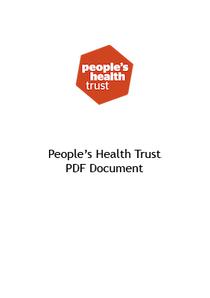In October 2024, the Prime Minister and the Secretary of State for Health and Social Care launched a consultation for the public, with stakeholder organisations, with the NHS and its workforce to shape the next Ten-Year Plan for NHS England (NHSE).
People’s Health Trust focused upon prevention in discussions with our network of experts by experience in our response.
Taking into account the views of grassroots community partners, our recommendations are:
- Make improving outcomes and narrowing the health inequalities gap a key milestone of each of the government’s five missions
- Introduce a cross-departmental Health Inequalities strategy for England
- An equity approach to prevention through proportionate universalism - ensuring those areas with the worst health and the longest delays receive targeted support through NHS funding formulas
- Close collaboration through Integrated Care with local authorities, public services, and civil society, prioritising grassroots and hyperlocal organisations
- A plan to meaningfully engage with minoritised population groups and representative organisations to better serve them. Adopt of the recommendations of the Hewitt Review, to bring about more localised approaches to health and care.
- Engage with older people’s groups, minoritised ethnic groups, refugees and asylum seekers, homelessness charities to understand needs of people who are more likely to be digitally excluded.
The nation’s health, particularly in the most disadvantaged areas, has been worsening for some time and health inequalities widening. We strongly believe that primary prevention should be within the scope of this consultation and at the heart of a strategy surrounding the new NHS Ten-Year Plan. The building blocks of health need to be seen and addressed if the government truly intends to prevent ill health.
Without a national primary prevention agenda guided by a Health in All Policies approach and a cross-departmental Health Inequalities strategy, NHS England’s work to reduce the impacts of disease, injury and illness won’t reduce the incidences of them or narrow the gaps in life expectancy and healthy life expectancy.

Almost 2/3 of partners surveyed think that local health services are meeting local people’s needs badly or very badly.
To inform this submission, we convened two roundtable discussions with our network of experts by experience (comprised of current and recently funded partners), as well as a survey, hearing testimony from 42 grassroots community organisations from across the country. These organisations are working with more than 20,000 residents in neighbourhoods experiencing some of the sharpest health inequalities in England. Our submission focuses upon what prevention should look like. These community leaders shared their views and experiences with us, highlighting their depth of experience in practical prevention work in the most disadvantaged communities, their crucial role as an early warning ‘intelligence’ system regarding health and social issues emerging for people, and some quite mixed experiences of their engagements with NHS Trusts and Integrated Care Boards.


